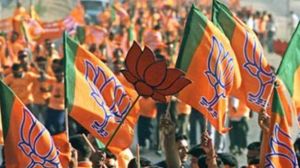The Jharkhand case: With great respect
Nothing succeeds like success. Now that the murky politics of Jharkhand is behind us, thanks largely to the March 9 order of the Supreme Cou...

Nothing succeeds like success. Now that the murky politics of Jharkhand is behind us, thanks largely to the March 9 order of the Supreme Court, it is time to reflect on what prompted the Speaker of the Lok Sabha to stress the need for a Presidential Reference under Article 143 of the Constitution8212;as to the limits imposed by India8217;s Constitution on the two great organs of the State, viz., Parliament and State Legislatures on one hand and the Courts on the other.
In its order, the Supreme Court issued the following directions:
1. That the Session of the Jharkhand State Assembly convened for 10th March, 2005, be directed to continue on 11th March, 2005, and on that day the vote of confidence be put to test, and that the order of the Court would constitute notice of the meeting of the Assembly for 11th March and no separate Notice would be required.
2. That the only agenda in the Assembly on 11th March, 2005, would be to have a floor test between the contending political alliances;
3. That the proceedings in the Assembly shall be conducted totally peacefully, 8220;any disturbance, caused would be viewed seriously by the Court8221;;
4. That the result of the floor test would be announced by the Protem Speaker 8220;faithfully and truthfully8221;; and
5. That the Chief Secretary and the Director General of Police, State of Jharkhand, would see that all the elected Members of the Legislative Assembly freely, safely and securely attend the Assembly and no interference or hindrance is caused 8220;by anyone therein8221;.
If the end justifies the means, there is no doubt that it was this firecracker order that prompted the Central Government of the day to withdraw its party support to a minority Chief Minister who should never have been sworn in by the Governor as the State Chief Minister, in the first place which in turn prompted Mr Soren to hand in his resignation making way for the majority party in the Assembly to form a Government. We should all be cheering the Court for upholding Good Governance, the Rule of Law and Parliamentary Democracy. Yes. But I have reservations8212;and I must express them.
I believe that in every branch of human activity8212;whatever it be, whether it is politics or law or any other8212;the important thing is for those in charge to think as the saying goes two steps ahead of the market. This is where the order of the Supreme Court is with great respect to be faulted8212;the delicate balance of powers in our Constitution has been disturbed. This why Mr Somnath Chatterjee as the acknowledged Head of all Legislative Bodies in the country was right to express his anguish.
The problem, as it appears to me, is that whatsoever the provocation and however justified by events, a coach-and-four has been driven through what I would call the boundary-provisions in our Constitution. To me, the order of March 9 serves as a disturbing precedent for Courts8212;in the future8212;not only the Supreme Court but also any High Court8212;to direct how proceedings of the Lok Sabha or Rajya Sabha or State Assemblies should or should not be conducted by its presiding officers. After all, the powers of High Courts to issue writs, orders and directions are co-equal with the powers of the Supreme Court.
Let me explain. Under our Constitutional Scheme, whether we like it or not, the two Houses of Parliament and all Legislative Assemblies in every State are placed on the same exalted footing. Under Articles 122 and 212 of the Constitution, the validity of any proceedings in Parliament or in any State Legislature cannot be called in question in any Court on the ground of any alleged irregularity of procedure and no officer or member of Parliament or of any State Legislature in whom powers are vested by or under the Constitution for regulating procedure or the conduct of business, or for maintaining order, can be made subject to the jurisdiction of any court in respect of the exercise by such officer or member of those powers. That some State Legislatures and their presiding officers do not deserve the immunity prescribed in Article 212 may justify an amendment to that provision; it does not justify a transgression of it.
Theoretically speaking, the order of March 9 is a sufficient precedent for the Courts the Supreme Court or any High Court to direct who should administer oath to Members of Parliament, and as to when a session of Parliament should meet and continue meeting, as to what should be the agenda and as to when directions should be issued for a vote whether a vote of confidence or otherwise to be taken on the floor of the Lok Sabha. It would also serve as a precedent for the Courts including the Supreme Court or any High Court for issuing directions as to when the result of any vote taken inside the House should be announced. Besides, the order of a Court could take the place of the customary summons of the President to members as to when the Lok Sabha or Rajya Sabha is to meet and for what purpose. What was done for a Legislative Assembly could obviously be replicated8212;for Parliament. This is why a Presidential Reference was called for, particularly because the Supreme Court order had unconsciously overlooked and ignored binding precedents in landmark cases8212;Keshav Singh8217;s case 1975 Bench of 7 Judges and in the case of Khoto Hollohan Bench of 5 Judges: the latter had clearly established that proceedings inside State Legislatures cannot be dictated to by Courts nor called in question by Courts, even when they have not been conducted in accordance with the Rules of Business of the House.
And then, as the saying goes, 8220;What is sauce for the goose is sauce for the gander.8221; Could the conduct of a judge of the Supreme Court or High Court or their judgments be discussed or criticised inside the House of a State Legislature or of Parliament. God forbid, no8212;but why not? Only because of the balancing boundary provision8212;Article 211 qua State Legislatures and Article 121 qua Parliament discussion inside the Houses of any judgment or conduct of any Judge of the Superior Judiciary is constitutionally prohibited.
The great organs of the State are by constitutional diktat left supreme in their own respective spheres. That is only because the supreme document of governance8212;the document that binds Courts, Parliament and State Legislatures is above them all8212;the Constitution, is on a pedestal as it were proclaiming to one and all that 8220;how so ever high you be the Constitution is above you.8221;
Lastly and above all, to invite the Court8217;s attention to the fact that it has overlooked a Constitutional provision and the Court should correct it is by no means an invitation to a 8220;confrontation8221; with the Judiciary. Far from it. After all, it was a Judge of the Supreme Court8212;a distinguished one at that8212;who invariably liked to quote in his judgments a sentence from a famous letter of Oliver Cromwell written to the parishioners of the Church of Scotland, which read: 8220;I beseech you, in the bowels of Christ, think it possible you may be mistaken.8221; Good advice. I may be mistaken, you may be mistaken. Even Judges, howsoever high, may be mistaken.
Professor Goodhart was Editor of that most prestigious English Law Quarterly8212;the LQR8212; for 50 long years. On his retirement, Lord Diplock, a senior member of the Judicial Committee of the House of Lords English8217;s highest court of appeal wrote a commemorative little piece. He Diplock said that he always thought that Professor Goodhart was on his side, because whenever Diplock8217;s judgment was commented on by Professor Goodhart the remarks were always prefaced with the words: 8220;but with greatest respect8221;. Diplock thought: 8220;Ah, this must be because Goodhart and I belonged to the same university8221;.
But when he retired, Prof Goodhart let it be known how he had learned to criticise judgments without appearing to be offensive8212;he learnt it from Sir Frederick Pollock. The advice of the great Pollock was that if you are doubtful whether the judicial reasoning is wholly unassailable, you preface your comment on the judgment with the words: 8220;with respect8221;. If the judgment is obviously wrong, you say, 8220;with great respect8221;. And if it is one of those judgments that have to be seen to be believed, the formula to adopt is: 8220;but with the greatest respect!8221;
- 01
- 02
- 03
- 04
- 05































